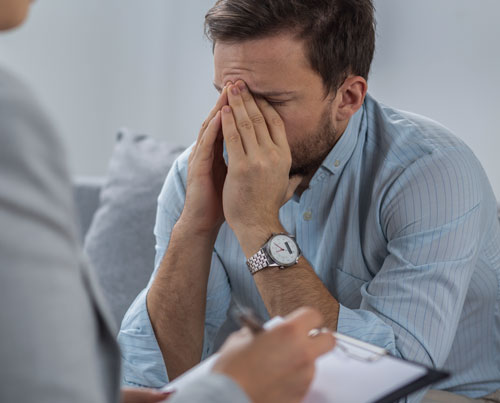Impulse Control Disorder and Addiction
However, people with impulse control disorders aren’t able to easily do this. When you add a substance use disorder into the mix, an impulse control disorder can be even harder to manage. Learn more about these complex conditions and see how you can get help for them.
What Are Impulse Control Disorders?
Impulse control disorders are conditions characterized by trouble controlling behaviors or emotions. This is not unlike borderline personality disorder, but impulse control disorders go beyond this. People with these conditions behave in a way that violates people’s rights, breaks the law, or goes against society. About 10.5% of people have an impulse control disorder.
Unfortunately, many people with an impulse control disorder don’t receive proper treatment. This is because it isn’t always diagnosed properly and it can be overlooked. The more medical professionals understand this disorder, the more likely patients can be treated for it.
Is It a Behavior or a Disorder?
As we mentioned previously, sometimes we feel an impulse to do something. When we act impulsively, it results from the tension that has gotten so high that we can no longer resist doing it. Although you might feel relief after doing this, this is short-lived. You might feel ashamed or guilty afterward. Acting impulsively often can also result in even more feelings of regret or distress. Impulse control disorder consists of repeated impulsive actions.

Types of Impulse Control Disorders
An impulse control disorder will usually show up in childhood or adolescence. Below is a list of the most common ones.
Conduct Disorder
This is characterized by behavior that consistently goes against social rules. Someone with conduct disorder might destroy property, skip school, run away, or be aggressive toward animals and people. Children under the age of 18 are usually diagnosed with this disorder. Symptoms of conduct disorder in children mirror those of antisocial personality disorder in adults.
Intermittent Explosive Disorder
People with intermittent explosive disorder (IED) tend to have angry and impulsive outbursts, which usually last about 30 minutes. These episodes can be triggered by something trivial involving someone they know. Sadly, they can cause a great deal of distress, ruin relationships, cause problems at work/school, and result in financial and legal issues. Like those with conduct disorder, people with IED can also show aggression toward people, property, and animals.
Kleptomania
Do you find that you frequently steal things impulsively and unnecessarily? You might have kleptomania. People with this impulsive control disorder usually steal objects and either end up throwing them away or give them to someone else. After stealing, “kleptos” might feel a sense of gratification. The trouble with kleptomania lies not in the actual stealing, but in the impulsion to steal and a lack of self-control. Those with this disorder usually experience personal and legal troubles. About 4% to 24% of people who shoplift might have kleptomania.
Oppositional Defiant Disorder
Those with oppositional defiant disorder (ODD) are typically annoyed easily, lose their temper often, and become resentful or angry. It’s not uncommon for them to bother people on purpose, blame others for their problems, challenge authority, and defy rules. Symptoms of ODD can appear as early as 3 or 4 years old.
Pyromania
“Pyros” deliberately and repeatedly set fires. Common symptoms of pyromania include a compulsive need to set fires, relief after setting the fire, and an obsession with fire and fire-setting paraphernalia. The only reason people with pyromania set fire is because they feel good after doing so. Pyromania is rare in the U.S.
Signs and Symptoms of an Impulse Control Disorder
Although signs and symptoms of impulse control disorders vary, they’re all similar in basis.
- Behavioral symptoms: Promiscuous or risky behavior, lying, stealing, starting fires, and volatile or aggressive behaviors
- Cognitive symptoms: Flying into a rage, feeling agitated or being irritable, trouble concentrating, and obsessive behavior
- Emotional and social symptoms: Isolation from friends and family, anxiety/detachment, feelings of regret or guilt, low self-esteem, and drastic shifts in moods and thoughts
Causes of Impulse Control Disorder
Why does an impulse control disorder originate? There isn’t one root cause, but several factors can contribute to its development.
- History of emotional and physical drama
- Having relatives with an impulse control disorder or other mental illness (i.e., bipolar disorder, obsessive-compulsive disorder (OCD), schizophrenia, attention-deficit hyperactivity disorder (ADHD), depression)
- Below average intelligence
- Difficult temperament as an infant
- Being a victim of abusive or neglectful parents
- Abnormalities in parts of the brain (orbitofrontal cortex, prefrontal cortex, amygdala
- Having relatives with a substance use disorder
- Problems controlling your emotions
- Being exposed to violence
- Reduced basal cortisol activity
- Serotonin abnormalities

The Link Between Impulse Control Disorder and Addiction
An impulse control disorder can commonly coexist with a substance use disorder. In fact, about 35% to 48% with IED also have a substance abuse problem. Other studies show that 33% of people with pyromania have a coexisting substance use disorder, as well as 22% to 50% of those with kleptomania.
Impulse control disorders and addiction have plenty in common. They are both defined by a lack of control as well as a compulsion. In the case of a substance use disorder, there’s a lack of control of usage and compulsive behavior. Those with both disorders also have urges to carry out a certain behavior or to use a substance. They tend to involve a “reward system” in the brain, too — dopamine plays a large role in both of these disorders.
When two disorders coexist like this, you have what’s called co-occurring disorders, or dual diagnosis. Because of how these affect your body and mind, you must get treatment for them simultaneously. This way, you’ll be able to healthily recover from them and determine their root causes.
Why Do You Need Dual Diagnosis Treatment?
People with co-occurring disorders need dual diagnosis treatment, but they don’t always seek it. In 2017, about 94% of people who needed treatment for substance use disorder but didn’t get it didn’t think they needed it. On top of that, only 22% of people with IED received treatment for their outbursts.
If you have coexisting disorders, it can be hard to tell which one came first: the mental disorder or the substance use disorder. By treating these both at the same time, doctors can figure out which caused the other. However, someone with an impulse control disorder and addiction might not seek treatment by themselves. In these cases, family or friends could make them see that they need help.
Planning an Intervention
If your loved one has a problem and they can’t see it, you might have to perform an intervention. This involves close friends, family, and even coworkers coming together to convince the person in question that they need help. Your loved one might show signs of aggression and hostility if they have an impulse control disorder, so in this case, you might want to involve a professional interventionist. This is so that everyone involved in the meeting can be safe.
Treatment Options for Impulse Control Disorder and Addiction
Fortunately, there is hope in the form of dual diagnosis treatment. Impulse control disorder and addiction treatment can happen at a rehab facility that offers outpatient, or inpatient/residential treatment. Rather than having separate treatment for each disorder, you should follow an integrated treatment plan.
Detox
If you have a severe addiction, you might need a period of detox as your first step. This is available at some facilities separate from treatment centers. CNV Detox prefers to use non-medical detox, but we’ll administer medication if absolutely necessary.
Outpatient Treatment
Outpatient treatment, on the other hand, is more flexible than inpatient. You attend programming during the day and can go home in the evening. This is best for people with mild co-occurring disorders and a stable home environment. The flexibility of outpatient programs makes them an attractive option for patients who need to attend school or go to work.
Therapy
Therapy is an integral part of dual diagnosis treatment. Below are some popular forms of therapy:
- Cognitive behavioral therapy (CBT): This mode of therapy helps patients change their negative thoughts and behaviors into positive ones. These will eventually lead to positive behaviors as well.
- Dialectical behavior therapy (DBT): A form of CBT, DBT helps people control their emotions and negative behaviors like drug use and suicide attempts. This can be especially effective for people with an impulse control disorder.
- Contingency management: This offers patients rewards for avoiding unhealthy behaviors and practicing healthy ones.
Individual,group, and family therapies are also valuable and can teach you how to improve your relationships. Parents of children or adolescents with impulse control disorders can especially benefit from family therapy. Here, they’ll learn how to respond to their child’s behavior in a positive way.
CNV Detox Can Help You Recover
Our detox program in Los Angeles, CA is staffed by licensed medical professionals who genuinely care about your well-being. Substance use disorder doesn’t have to take over your life. Contact us today to learn what we can do for you.
Take the Next Step
The path to recovery is only one step away. Begin your treatment at CNV Detox in Los Angeles, California as soon as the same day. For your convenience, we work 24/7. Our team is ready to help as soon as you reach out.
